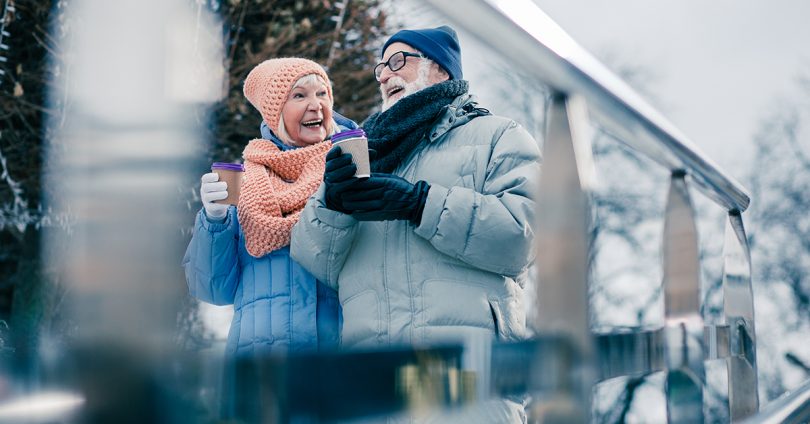For many people, tripping and falling doesn’t pose a serious risk. But for older adults, falls are a leading cause of injury that can impact not only an individual’s health, but also their quality of life. It’s important for seniors and their families to make falls prevention a priority. Some of Sunnybrook’s experts in falls prevention, Kellen Baldock, Sara Cheung and Belinda Wagner, speak to how individuals and families can support falls prevention in their everyday lives.
The importance of physical activity
When it comes to falls prevention, physical activity is key.
“When seniors are inactive and sedentary, they are more likely to decondition. It’s one of the risk factors [for falls]: poor activity tolerance, weakness, pain,” says Sara, a physiotherapist in Sunnybrook’s Geriatric Day Hospital, an interdisciplinary outpatient therapy program that provides care for seniors to help them continue to live at home safely.
Sara says stay-at-home orders during the pandemic made it difficult for many seniors to maintain a level of physical activity.
“A lot of seniors have had serious deconditioning from staying home, being sedentary,” she says. “Reduced interactions in the community as they stopped going out to run errands or socialize has had an impact on their mobility, function and overall mental wellbeing.”
Belinda Wagner is a physiotherapist and the team lead for Sunnybrook’s Emergency Department One team, a health professionals team that provides support to patients (most of whom are 70+) who don’t need to stay in hospital, but would benefit from community services. The team ensures discharged patients are well-connected and supported in the community to hopefully prevent a return to hospital. She says physical activity doesn’t mean older adults need to start an intense gym routine, but movement is critical.
“The bottom line is the more you move, the more you’re up and exercising, [the better]. Walks around the block, mall walks, getting up periodically. It can be an exercise program, but functional movement first and foremost is the focus,” she says.
Make a plan
With the cold weather arriving, sidewalks will become slippery, the temperature will drop and older adults may be hesitant about heading outdoors. While it might be more difficult to get outside, Kellen, an Occupational Therapist and Project Manager for Senior Friendly and Quality at Sunnybrook, says making a plan with family members can help.
“Make a plan for how you’re going to stay active this winter,” he says, adding he encourages family members to have this conversation with the seniors in their life. “If family members are involved in making a plan, they can check in and see how that plan is going.”
Another aspect to planning is ensuring the home environment is as safe as possible. Through Sunnybrook’s Specialized Geriatric Services, an outreach team can go into a senior’s home to not only assess home safety (i.e. fall or tripping hazards), but to complete a Comprehensive Geriatric Safety Assessment.
“I feel like most seniors would benefit from a home safety assessment, just to have a look at their environment, how they move within their home, see if they do things safely and to make sure they have adequate gait aides such as canes or walkers,” says Sara. Those assessments can be completed through Sunnybrook’s Specialized Geriatric Services with a physician’s referral. Individuals can also self-refer through Home and Community Care Support Services.
Make use of mobility aids
One way to reduce the risk of falls is to use mobility aids such as canes or walkers, which can provide additional stability and support.
Kellen says if you (or a family member) need to hold a wall when walking or are unstable without support, it could be time to discuss using a mobility aid.
“Some of those signs are indicators that someone might need a bit more support, and the risk of falls is greater if you can’t support yourself. If you’re looking for other things to help you, especially things that aren’t designed to support you while you move, you have a greater risk of falling,” he says.
There may be some reluctance to use mobility aids, but Belinda says they are an important tool to keep older adults safe, active and healthy.
“You’re keeping your independence, you’re keeping your ability to do everything as much on your own, to keep safe and to keep moving,” she says.
Kellen suggests speaking to your family physician or contacting home care for a connection to an occupational therapist or physiotherapist to explore whether a mobility aid is a good option for yourself or a family member. For all people, including older adults, remaining active and exercising throughout the winter is important and can actually reduce the risk of falls.
“It’s how do I stay active and moving in a safe way that’s supported and where there’s a plan.”
You can reach Home and Community Care for general inquiries or to make a referral at 310-222—no area code required.
You can reach Sunnybrook’s Geriatric Day Hospital at 416-480-6888








